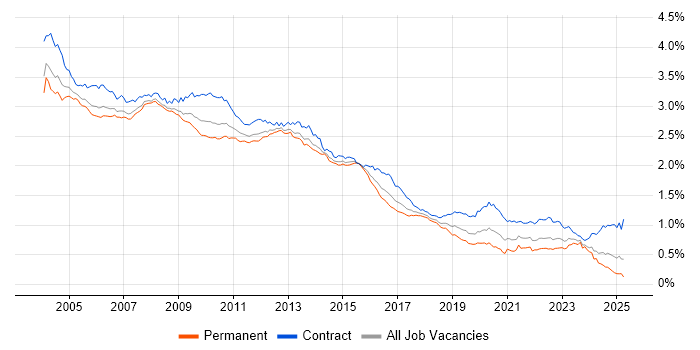Oracle Database (Oracle RDBMS)
UK > England
The table below provides summary statistics and salary benchmarking for jobs advertised in England requiring Oracle Database skills. It covers permanent job vacancies from the 6 months leading up to 5 March 2026, with comparisons to the same periods in the previous two years.
| 6 months to 5 Mar 2026 |
Same period 2025 | Same period 2024 | |
|---|---|---|---|
| Rank | 511 | 532 | 521 |
| Rank change year-on-year | +21 | -11 | -10 |
| Permanent jobs citing Oracle Database | 130 | 108 | 253 |
| As % of all permanent jobs in England | 0.20% | 0.26% | 0.36% |
| As % of the Database & Business Intelligence category | 2.11% | 1.40% | 1.95% |
| Number of salaries quoted | 81 | 40 | 182 |
| 10th Percentile | £41,250 | £42,750 | £36,250 |
| 25th Percentile | £46,250 | £52,188 | £42,500 |
| Median annual salary (50th Percentile) | £58,000 | £57,250 | £55,000 |
| Median % change year-on-year | +1.31% | +4.09% | - |
| 75th Percentile | £59,500 | £62,500 | £70,000 |
| 90th Percentile | £77,500 | £67,750 | £82,250 |
| UK median annual salary | £57,250 | £57,500 | £56,541 |
| % change year-on-year | -0.43% | +1.70% | +2.80% |
All Database & Business Intelligence Skills
England
Oracle Database falls under the Databases and Business Intelligence category. For comparison with the information above, the following table provides summary statistics for all permanent job vacancies requiring database or business intelligence skills in England.
| Permanent vacancies with a requirement for database or business intelligence skills | 6,175 | 7,689 | 13,005 |
| As % of all permanent jobs advertised in England | 9.73% | 18.71% | 18.74% |
| Number of salaries quoted | 3,923 | 4,600 | 10,584 |
| 10th Percentile | £35,000 | £37,980 | £35,000 |
| 25th Percentile | £45,000 | £48,750 | £43,750 |
| Median annual salary (50th Percentile) | £60,000 | £65,000 | £57,500 |
| Median % change year-on-year | -7.69% | +13.04% | -11.54% |
| 75th Percentile | £81,250 | £87,500 | £76,250 |
| 90th Percentile | £100,000 | £115,000 | £95,000 |
| UK median annual salary | £60,000 | £65,000 | £57,500 |
| % change year-on-year | -7.69% | +13.04% | -8.00% |
Oracle Database
Job Vacancy Trend in England
Historical trend showing the proportion of permanent IT job postings citing Oracle Database relative to all permanent IT jobs advertised in England.

Oracle Database
Salary Trend in England
Salary distribution trend for jobs in England citing Oracle Database.

Oracle Database
Salary Histogram in England
Salary distribution for jobs citing Oracle Database in England over the 6 months to 5 March 2026.
Oracle Database
Job Locations in England
The table below looks at the demand and provides a guide to the median salaries quoted in IT jobs citing Oracle Database within the England region over the 6 months to 5 March 2026. The 'Rank Change' column provides an indication of the change in demand within each location based on the same 6 month period last year.
| Location | Rank Change on Same Period Last Year |
Matching Permanent IT Job Ads |
Median Salary Past 6 Months |
Median Salary % Change on Same Period Last Year |
Live Jobs |
|---|---|---|---|---|---|
| London | +60 | 52 | £50,000 | -17.36% | 20 |
| South East | +14 | 42 | £58,000 | +5.45% | 19 |
| South West | -12 | 10 | £60,000 | -14.02% | 4 |
| East of England | +16 | 9 | - | - | 3 |
| Midlands | -26 | 9 | £52,500 | -12.50% | 7 |
| North of England | -50 | 8 | £53,000 | -3.64% | 12 |
| East Midlands | -21 | 7 | £52,500 | -9.48% | 5 |
| North West | -28 | 7 | £53,000 | -7.83% | 5 |
| West Midlands | -24 | 2 | £38,000 | -36.67% | 2 |
| Yorkshire | -42 | 1 | - | - | 7 |
| Oracle Database UK |
|||||
Oracle Database
Co-Occurring Skills & Capabilities in England by Category
The following tables expand on the one above by listing co-occurrences grouped by category. They cover the same employment type, locality and period, with up to 20 co-occurrences shown in each category:
|
|
||||||||||||||||||||||||||||||||||||||||||||||||||||||||||||||||||||||||||||||||||||||||||||||||||||||||||||||||||||||||||||||
|
|
||||||||||||||||||||||||||||||||||||||||||||||||||||||||||||||||||||||||||||||||||||||||||||||||||||||||||||||||||||||||||||||
|
|
||||||||||||||||||||||||||||||||||||||||||||||||||||||||||||||||||||||||||||||||||||||||||||||||||||||||||||||||||||||||||||||
|
|
||||||||||||||||||||||||||||||||||||||||||||||||||||||||||||||||||||||||||||||||||||||||||||||||||||||||||||||||||||||||||||||
|
|
||||||||||||||||||||||||||||||||||||||||||||||||||||||||||||||||||||||||||||||||||||||||||||||||||||||||||||||||||||||||||||||
|
|
||||||||||||||||||||||||||||||||||||||||||||||||||||||||||||||||||||||||||||||||||||||||||||||||||||||||||||||||||||||||||||||
|
|
||||||||||||||||||||||||||||||||||||||||||||||||||||||||||||||||||||||||||||||||||||||||||||||||||||||||||||||||||||||||||||||
|
|
||||||||||||||||||||||||||||||||||||||||||||||||||||||||||||||||||||||||||||||||||||||||||||||||||||||||||||||||||||||||||||||
|
|
||||||||||||||||||||||||||||||||||||||||||||||||||||||||||||||||||||||||||||||||||||||||||||||||||||||||||||||||||||||||||||||
|
|||||||||||||||||||||||||||||||||||||||||||||||||||||||||||||||||||||||||||||||||||||||||||||||||||||||||||||||||||||||||||||||
